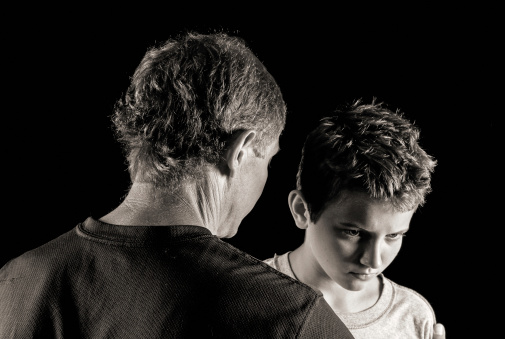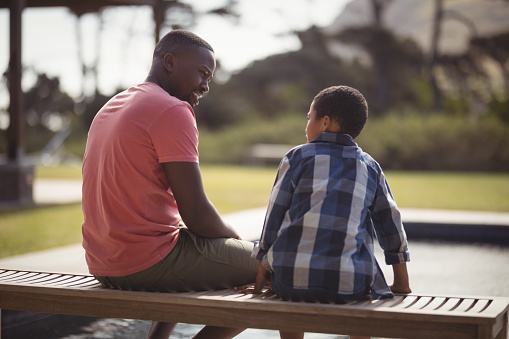What is the goal of good parenting?
Every child begins life totally dependent on us for loving attention to his or her needs. Without a responsible, loving parent, a child would die from lack of food, shelter, clothing and loving touches. That phase passes into learning how to do appropriate tasks for himself. The parents’ job is to encourage gradual independence. That means first of all teaching a child how to feed himself, tie her shoes, dress himself, pick up toys, etc. Gradually a good parent teaches social graces…to say “Please” and “Thank you” at appropriate times. When to say “Excuse me” before interrupting a conversation. How to share toys and feel empathy for someone who’s hurting.
First you teach a skill. Then you expect that child to use the skill responsibly. Sometimes this requires multiple reminders. Many times it requires enforcing age-appropriate consequences for failure to follow the rules. ALL of this means the parent is dedicated to the end result of an adult child who is a caring, responsible member of our world.
The Cost of Good Parenting

The cost of good parenting is that I, as the parent, have to sacrifice a lot of my own comfort in order to be there for the sake of my child. It also means learning to take reasonable care of my own needs so that I don’t resent the requirements of parenting a child.
You may be asking, “Did you do this?” Sometimes. Sometimes not. What I’m sharing today comes from my own successes and failures as well as what I’ve observed in my clients. Overall I think I did alot of things well. I wish I had done a better job of meeting my own needs for nurturing so that parenting didn’t wear me out as much. And, I wish that during some very hard periods in my life, I had sought support for myself so I could also do a better job of supporting what my children were experiencing.
Irresponsibility Causes Poor Parenting

Maybe I had a child before I was prepared to take on such a long-term demanding goal. In that case, child-rearing becomes a crash coarse in growing up. Not the easiest way to grow up. But unless you want your child to live with the consequences of your immaturity and neglect, it’s a great motivation to get serious about being an adult with adult responsibilities. My friend Elisabeth Stitt teaches joyful parenting skills.
Guilt Causes Poor Parenting
I see guilt as the motivator for parentling decisions most often in parents who have gone through a divorce and regret the pain that has caused their children. Or have a highly dysfunctional relationship with their partner that is reflected in the unhappiness of their children. Sometimes, to reduce their feelings of failing, these parents are overly indulgent. This plays out with setting up rules that are not enforced or buying things for the child to make up for your perceived failures. Guilt is a terrible reason to make any parenting decision. Choices made to ease your guilt will almost always have a negative effect on your child.
Pity Causes Poor Parenting

It’s one thing to feel compassion for a child who is hurting. Compassion may motivate a parent to get professional help for a child who’s being bullied, for instance. Or tutoring help for a child who’s struggling with math. Or possibly medical diagnosis and help for a problem. Pity, on the other hand, is allowing a child to escape the consequences of their own behavior because it’s uncomfortable. Their discomfort…read emotional pain…makes you uncomfortable so you do something to relieve the pain of watching your child hurt. This is what is behind the choice to berate a teacher for giving your child a poor grade because he didn’t do the homework. It’s pity when you allow a child to neglect brushing her teeth because “I don’t want to.” It’s pity when you pay a teenagers speeding ticket rather than requiring him to work it off with community service.
Irresponsibility, Guilt and Pity result in terrible parenting decisions.
Motivation for Growth
Unfortunately, one of the best and most frequent motivations for growth is pain. The pain of my son’s grief over the loss of his father at a young age caused me to make many parenting decisions out of pity for him. As he grew up, he learned that if he got into trouble, and acted sad enough or regretful enough, I would bail him out. I essentially took on the responsibility for his poor decisions which allowed him to be less responsible. This is the essence of codependence. When I prevent my child from experiencing the reasonable consequences of her own behavior, I am robbing her of valuable learning experiences that lead to a productive, well-adjusted adulthood.
Pain in my marriage motivated me to learn better communication and conflict management skills. Extreme discomfort with the choices of my adult son, eventually led to the examination of myself. Acknowledging whatever mistakes I may have made as a parent, I had to release him to learning his own lessons as an adult, rather than picking up the messes he made. It was not loving or helpful to continue being responsible for his choices rather than allowing him the human experience of learning from his mistakes. My book Pungent Boundaries shares a lot about our journeys of personal growth!
Allowing Age-Appropriate Pain as a Learning Tool
I’m assuming that you’re reasonable enough to recognize that pain must be age appropriate and not abusive. When I child breaks his arm because of riding a bike carelessly, you don’t deny medical care as a teaching opportunity! When a three-year-old throws a tantrum because he doesn’t want to go to bed, you don’t lock her in a closet! I am not talking about abuse in this newsletter! I’m recommending that you love a child enough to let them suffer reasonable amounts of pain as part of their learning to be responsible for their own choices.
One father’s twenty-one year old thought she was grown up enough to quit college and move across the country with her boyfriend. When her dad said he would no longer pay for her car insurance or cell phone, she accused him of being a terrible dad… of not loving her anymore. It broke his heart. He had to suffer the pain of risking their relationship by cutting off her financial support in order to lovingly give her the gift of assuming adult reponsibilities. A few months later she had a job, resumed her schooling with a scholarship and was paying for her car insurance and phone bill. In addition, their relationship was better than ever!
Parenting: a Catalyst for Personal Growth
Relationships of any kind are labs in which we make mistakes, have experiments that fail, and hopefully choose to learn from them in order to get better results. We aren’t given guide books for parenting. If we’re lucky, we had great examples in our own parents that provided a solid foundation. Otherwise we have two choices. We pass along the dysfunctions we grew up with, or we knuckle down, research, and learn so that we can give our children a better experience than we had. Make decisions today based on the ultimate goal of a responsible, productive, happy adult child tomorrow.
You have my love and support,

